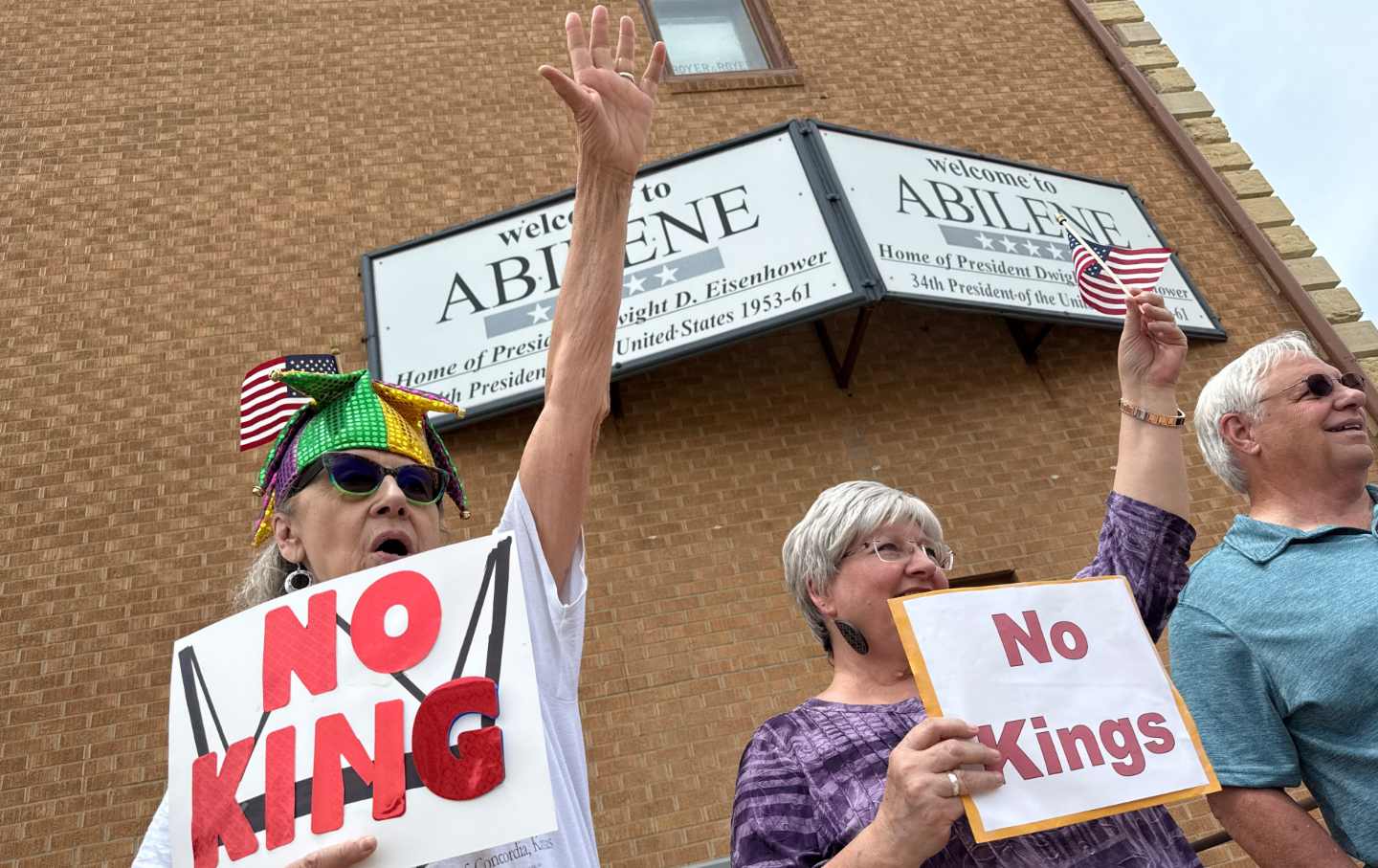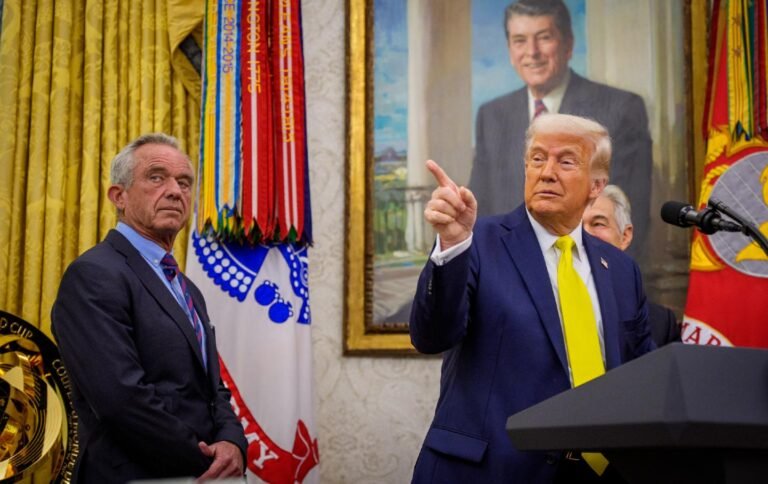October 27, 2025
Trump’s decimation of public health systems isn’t about efficiency, cost-saving, or even ideology. It’s about building a world without truth or the possibility of accountability.
Late on Friday, October 10, as public health workers logged off for a long weekend and others suited up to confront ongoing disease outbreaks, 1,257 scientists at the Centers for Disease Control and Prevention received e-mails informing them that their jobs no longer existed. Among those dismissed were elite disease detectives currently working on an active Ebola epidemic in Congo, senior epidemiologists, and the entire staff of Morbidity and Mortality Weekly Report (MMW)—the publication that first documented the AIDS epidemic and has been a pillar of essential public health science and reporting since 1930. The stated reason was bureaucratic. But the real purpose was plainly political: The Trump administration, which directly approved the firings, is erasing the means by which the consequences of its increasingly eugenicist health policies can be seen, counted, and judged.
The logic is straightforward, and it is evident not only in the Trump administration’s approach to health but also to essential economic, environmental, immigration, and crime statistics: If you destroy the systems that measure harm and appoint corrupt functionaries to invent your desired figures, you destroy the evidence of your responsibility. If you make truth unknowable, accountability becomes impossible.
Trump built his career on fraud: cooking the books, inflating assets, falsifying ledgers. Now he governs the same way. But still, many are responding to Trump and Robert F. Kennedy Jr.’s myriad misleading health claims by emphasizing the importance of debate. This plays straight into Trump’s hands, because Trump and his cronies aren’t, despite surface appearances, actually trying to claim authority over truth; they’re trying to make belief in truth itself untenable. In this context, debate is a ruse. It’s absurdist theater masquerading as bureaucratic seriousness, with transparently fabricated (and meaningless) numbers like the “650 percent discounts” on some medications that Trump claims to have delivered.
As historians and philosophers of science like Ian Hacking and Michel Foucault have long observed, metrics are never neutral. Every statistic, including mortality rates, overdose deaths, unemployment and homelessness figures, reflects political choices about what, how, and whom to count. In this context, the CDC’s data have played a major part in defining a moral horizon of public life, translating—or at least sustaining the potential to translate—individual suffering into collective responsibility to prevent and respond to it. When the MMWR in 1981 described five gay men with a rare pneumonia, for example, it didn’t just report an anomaly; it made a new reality visible, implicitly valued the lives and suffering of marginalized gay men, and ultimately compelled a response—even if it did so by appealing to fear and self-interest.
That is precisely why fascists target such institutions that make their violence visible. The fewer people you count, the fewer people you kill—at least on paper and, eventually, in court.
Authoritarians have long understood this. As Nazi defeat loomed, Berlin expanded Aktion 1005, a covert program begun in 1942 to exhume mass graves, burn bodies, and wipe records of murder—an effort to erase evidence of genocide. Stalinist Russia also paired mass death with statistical annihilation. When, refuting harvest reports and industrial statistics that had been fabricated to meet Stalin’s Five-Year Plan goals, the 1937 USSR census revealed catastrophic population losses, the regime invalidated the count, arrested the census leadership, and executed or imprisoned numerous statisticians, then mounted a replacement census with new numbers more acceptable to Stalin. But we need not reach all the way back to Nazi Germany or Stalinist Russia to see how controlling measurement and record-keeping is leveraged as means of controlling populations, consolidating power, and evading accountability. When Israel began carrying out acts of acute genocide in Gaza in late 2023, among its first strategic targets marked for destruction were—alongside its hospitals—the buildings housing Gaza’s public records and archives, rendering verification of mortality and property claims all but impossible.
Current Issue

In recent scenes more closely paralleling our present in the United States, during the height of the Covid-19 pandemic, many authoritarian leaders treated epidemiological data as a personal political tool. In Brazil, for instance, the federal government followed Jair Bolsonaro’s commands to remove cumulative totals of cases and deaths from its public reports, until a Supreme Court order later forced the restoration of these data. The move was widely denounced as a “statistical coup” aimed at masking the human toll of Bolsonaro’s failures. Brazilian federal police later indicted Bolsonaro—a close Trump ally—and his aides for inserting false vaccination data into the health ministry’s database. Similar tactics are reported elsewhere, particularly in places governed by yet other Trump-aligned figures. Hungary’s government under another Viktor Orbán, for example, centralized pandemic information and restricted access for journalists and the public. And in Narendra Modi’s India, official Covid death statistics have likewise been belied by excess-mortality analyses using state registration data, underscoring how political control over counting can minimize state culpability even amid mass loss.
In Trump’s case today, his attack on measurement is about far more than public health or economics. It is the culmination of his deeper political method: rule by disorientation and cognitive suffocation. Unlike fascism of of times past, the Trump regime doesn’t depend upon a coherent ideology.
In her 1951 classic The Origins of Totalitarianism, Hannah Arendt observed, “What convinces masses are not facts, and not even invented facts, but only the consistency of the system of which they are presumably part.” But with Trump, there is no consistency, no principle of noncontradiction in the lies he tells. Nor is there even an attempt to produce an impression of a coherent system. His regime instead thrives on fostering the conviction that no shared truth exists—that every claim to knowledge is manipulation. When every institution is said to be corrupt, every journalist a liar, every scientist a fraud, reality itself becomes suspect.
Trump officials aren’t simply lying. They are pursuing an organized effort to eradicate the distinction between truth and falsehood. Totalitarianism today begins not with the suppression of speech but with the systematic degradation of meaning. It seeks to transform the public, in Arendt’s terms, into “people for whom the distinction between fact and fiction and the distinction between true and false no longer exist.” Its goal isn’t to convince anyone of one story over another; it is to make people stop believing that any story could really be true.
The result is the growing experience of living in a world where both paranoia and trust somehow feel naïve, where every fear of persecution seems simultaneously both exaggerated and justified. It’s a psychic atmosphere in which perpetual disbelief seems like the only reasonable response.
This is the real force of Trump’s politics: He governs not through persuasion but through epistemic sabotage, producing so much confusion, constant oversaturation of the public sphere, and information/disinformation overload that exhaustion begins to stymie outrage and action is short-circuited by doubt and disbelief. When a sense of shared truth that allows for shared meaning and action collapses, people are corralled into a pen of political paralysis.
That is what makes the destruction of the CDC so ominous, with repercussions far beyond the agency. Trump and RFK Jr. are not just weakening essential government systems and undercutting public health; they are about dismantling the conditions of reality itself. Just as public health depends on measurement, democracy depends on shared facts and collective acts of meaning-making. Without those, there is no common world to deliberate from within nor any new world to be made together. There is instead only chaos, inundation, and violence in which crude power is the only currency left that matters.
It is tempting to understand this as the simple antithesis of liberal technocracy—that Trump has undone the rule of expertise by force of ignorance. But there’s a deep irony at play: The liberal technocratic order of public health that he is now dismantling prepared the ground for his return to power. For decades, public health and politicians administrators substituted empirical measurement for political action and responsibility. They built a bureaucratic religion of data and dashboards, with endless reports and peer-reviewed studies of health inequities detached from any meaningful political plan to address them. The fantasy was that if we simply achieved enough measurement, transparency, and technological advances, we could substitute for the necessarily political work of confronting disease-driving inequality through taxation and regulation so as to finally build real public health systems capable of ensuring health for all via universal medical and social care.
Public health came to mean surveillance and discipline rather than struggle and solidarity. Governance became the production and management of metrics, not the cultivation of community through direct investments in public caregiving and social reciprocity. When the Covid-19 pandemic exposed the bankruptcy of this model—when Americans saw that all the graphs in the world could not substitute for universal healthcare, housing, or paid sick leave—faith in public health institutions collapsed. The liberal fantasy that data would save democracy gave way to the reactionary counter-fantasy, given voice by Trump himself when he observed that Covid cases and deaths exist only if you measure them, that we might instead be saved by destroying data altogether. Thus, the path from Obama’s data dashboards to Trump’s data deletions and nihilism is far shorter than many imagine.
Popular
“swipe left below to view more authors”Swipe →
The depoliticization of public health—how many times have we heard experts claim that “public health is not political”?—and faith in knowledge alone helped hollow out the public sphere, giving much of the public a perception of public health as elitist and irrelevant to their everyday material conditions, needs, and social experiences. Despite repeated calls to fundamentally change their approach to public health in the wake of the Covid-19 pandemic disaster, the Biden administration refused to do so, instead insisting on perpetuation of the status quo of US health capitalism and thereby paving the way for Trump’s return to office. Now, in the hands of authoritarians, even just the technocratic instruments of public health are being destroyed.
What remains is the void—a world without shared measures, without evidence, without the means to say: This is what has happened, is happening, and will happen if policies do not change to address the underlying causes of disease and death—left by intensifying inequality, wellness profiteering, state violence, and public abandonment designed to serve the interests of billionaires at the expense of the broader public.
To destroy meaningful measurement is to destroy the possibility of democratic accountability and effective governance. The layoffs at the CDC aren’t about efficiency; they’re about erasure of facts, of responsibility, and ultimately of our lives. It is fitting, then, that the Trump administration now claims that some of those fired at the CDC were dismissed by mistake and will soon be hired back—a pattern that has developed around thousands of Trump layoffs since Elon Musk’s DOGE began illegally firing federal employees in droves and almost at random back in February. What such claims now mean in reality is anyone’s guess—and that’s the point: to keep us all endlessly guessing while nobody, including officials in the White House and Trump himself, knows what the hell is really happening.
Trump’s great grifting gift—initially enabled by unearned wealth and honed over decades through a total lack of regard for others alongside an insatiable drive for attention and domination—has always been to turn fraud into power. What we are seeing now is the culmination of this project: the falsification of the world itself.
More from The Nation

Canada’s shameful refusal to acknowledge its support of the far right yesterday and today.
Lev Golinkin

As an intern for Jon Tester’s campaign, I saw a disconnect between our claim to authentic Montanan populism and the reality on the ground. In 2025, we need something different.
StudentNation
/
Nick Perkins

Rural activists are ready to take their place and play their part in the coalitions that are forming.
Column
/
Anthony Flaccavento

In this week’s Elie v. U.S., The Nation’s justice correspondent warns of an upcoming SCOTUS case—and hails the wisdom of Uncle Iroh.
Elie Mystal




